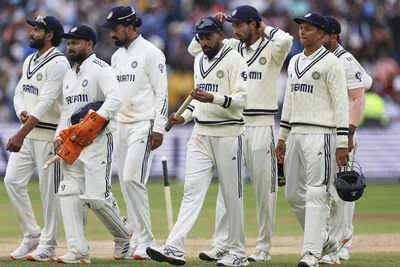
Former India head coach Ravi Shastri has pointed to two specific turning points that, in his view, decisively shifted the momentum in England’s favor during the recent third Test match at Lord’s. India, who appeared to be in a commanding position on multiple occasions, eventually fell short by 22 runs in a dramatic contest.
The first of these moments, Shastri emphasized, was the run-out of Rishabh Pant just before the lunch break on Day 2. Pant, who was batting fluently on 74, was involved in a mix-up that resulted in a direct-hit dismissal from Ben Stokes. Shastri called it “a game-changer,” stressing that India were in control until that point. The Pant-Rahul partnership had been flourishing, and a solid lead seemed within reach. Instead, the wicket right before lunch not only halted the momentum but also gave England renewed energy. According to Shastri, this was not just a lapse in judgment but a costly mistake that erased the psychological edge India was building.
The second moment Shastri underlined was Karun Nair’s dismissal early in India’s second innings. Coming in at a tense juncture, Nair had the responsibility to hold one end. However, he left a straight delivery that clipped the top of off stump, a misjudgment that the former coach described as a “huge lapse in concentration.” At that stage, India had just lost their first wicket and needed to consolidate. Instead, Nair’s premature exit opened the door for England’s bowlers to apply consistent pressure.
Shastri noted that while cricket matches are filled with fluctuations, certain events act as pivotal shifts in narrative. In this case, both Pant’s run-out and Nair’s soft dismissal represented moments when India let the match slip from positions of strength. He also mentioned how England capitalized on those brief openings, showing the ruthlessness required to win closely contested Tests.
Despite the loss, India had their chances. The lower order, especially Ravindra Jadeja, Jasprit Bumrah, and Mohammed Siraj, mounted a spirited fightback that brought the target within reach. At one point, with just 22 runs needed and wickets in hand, victory seemed imminent. Shastri praised the tailenders for their composure and fight, but reiterated that matches are often decided not at the end, but by what happens earlier—when pressure is still building, and small mistakes can have big consequences.
He emphasized the importance of mental toughness, especially from the top order, in crunch situations. “Had there been a little more discipline and awareness in those moments, this game was India’s to win,” he remarked.
As the series moves to Manchester with England now leading 2–1, Shastri’s reflections serve as a timely reminder. While the final moments draw attention, it’s often the overlooked ones—the misjudged single, the misread ball—that determine outcomes. India will look to learn from these lapses and come back sharper in the fourth Test.

